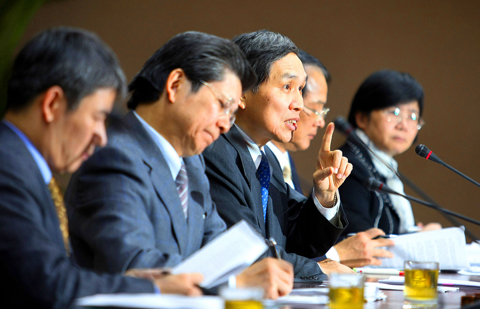Taiwan’s request to sign a trade-enhancement agreement (TEA) with the EU didn’t see much progress in WTO ministerial talks after Swedish trade minister Ewa Bjorling said Taiwan could not be included in the near-term agenda.
Bjorling said the EU has a number of FTA talks pending with ASEAN and the Gulf Cooperation Council, and Taiwan’s request couldn’t be discussed now, Minister of Economic Affairs Shih Yen-shiang (施顏祥) told reporters yesterday after concluding his WTO trip.
Shih talked to Bjorling during a meeting at Geneva in the hope of strengthening trade relations between the two sides by signing a TEM or free trade agreement with the EU.

PHOTO: CNA
However, Shih quoted Bjorling as saying Taiwan wouldn’t be included on the agenda for now.
Late in October, European Chamber of Commerce Taipei urged Taiwan to push for TEM negotiations with the EU only after signing the proposed economic cooperation framework agreement (ECFA) with China, which is expected to be inked in the middle of next year.
TRIPLE WIN
The chamber said the trade pact with China would benefit Taiwan’s economy, local businesses and foreign companies considering Taiwan as a springboard to China, and would boost Taiwan’s economy by 3.8 billion euros (US$5.7 billion).
During yesterday’s press briefing, Shih also said a review meeting on opening Taiwan’s major industries to China — including flat panels, semiconductors and petrochemicals — will be held by the end of the month.
He said authorities have completed reports on the industries and the ministry would hold an intra-ministerial meeting this month to finalize the plans.
Taiwanese companies have repeatedly requested that the government allow them to set up more advanced facilities — such as 12-inch fabs — across the Taiwan Strait.
A number of foreign firms have already gained access in China, and Taiwan risks losing out if the restrictions remain.
Separately, the ministry succeeded in helping local industries sign 43 memorandums of understanding (MOUs) with their partners in China, Shih said.
Since last December, the ministry has worked to bridge the divide between Taiwanese and Chinese industries in terms of possible cooperation and standards collaboration to help local firms get a foothold in China’s growing market.
The MOUs include agreements on solar power, automobiles, wind power, precision machinery, light-emitting diodes (LED) and herbal medicine.
ASSOCIATIONS
The MOUs are mostly between cross-strait associations, while benefits for companies in terms of business dollars will be realized after a common standard is finalized between both sides of the Strait, said Wu Ming-ji (吳明機), director-general of the industrial technology department.
Citing LEDs as an example, he said Taiwanese firms could seize the chance to standardize product design and development to gain access to China and other markets.

The seizure of one of the largest known mercury shipments in history, moving from mines in Mexico to illegal Amazon gold mining zones, exposes the wide use of the toxic metal in the rainforest, according to authorities. Peru’s customs agency, SUNAT, found 4 tonnes of illegal mercury in Lima’s port district of Callao, according to a report by the non-profit Environmental Investigations Agency (EIA). “This SUNAT intervention has prevented this chemical from having a serious impact on people’s health and the environment, as can be seen in several areas of the country devastated by the illegal use of mercury and illicit activities,”

NEW PRODUCTS: MediaTek plans to roll out new products this quarter, including a flagship mobile phone chip and a GB10 chip that it is codeveloping with Nvidia Corp MediaTek Inc (聯發科) yesterday projected that revenue this quarter would dip by 7 to 13 percent to between NT$130.1 billion and NT$140 billion (US$4.38 billion and US$4.71 billion), compared with NT$150.37 billion last quarter, which it attributed to subdued front-loading demand and unfavorable foreign exchange rates. The Hsinchu-based chip designer said that the forecast factored in the negative effects of an estimated 6 percent appreciation of the New Taiwan dollar against the greenback. “As some demand has been pulled into the first half of the year and resulted in a different quarterly pattern, we expect the third quarter revenue to decline sequentially,”

DIVERSIFYING: Taiwanese investors are reassessing their preference for US dollar assets and moving toward Europe amid a global shift away from the greenback Taiwanese investors are reassessing their long-held preference for US-dollar assets, shifting their bets to Europe in the latest move by global investors away from the greenback. Taiwanese funds holding European assets have seen an influx of investments recently, pushing their combined value to NT$13.7 billion (US$461 million) as of the end of last month, the highest since 2019, according to data compiled by Bloomberg. Over the first half of this year, Taiwanese investors have also poured NT$14.1 billion into Europe-focused funds based overseas, bringing total assets up to NT$134.8 billion, according to data from the Securities Investment Trust and Consulting Association (SITCA),

Taiwan’s property transactions in the first half of this year fell 26.4 percent year-on-year to about 130,000 units, as credit controls and mortgage restrictions dampened demand, data from the Ministry of the Interior showed yesterday. Keelung saw the steepest decline, with transactions plummeting 45.6 percent to just 2,041 units — the lowest since the ministry began its survey in 2006. In contrast, Miaoli County was the only region to experience year-on-year growth, with transactions rising 2.4 percent to 3,229 units. Great Home Realty Co (大家房屋) attributed the increase in deals in Miaoli, particularly Jhunan (竹南) and Toufen (頭份) townships, to spillover demand